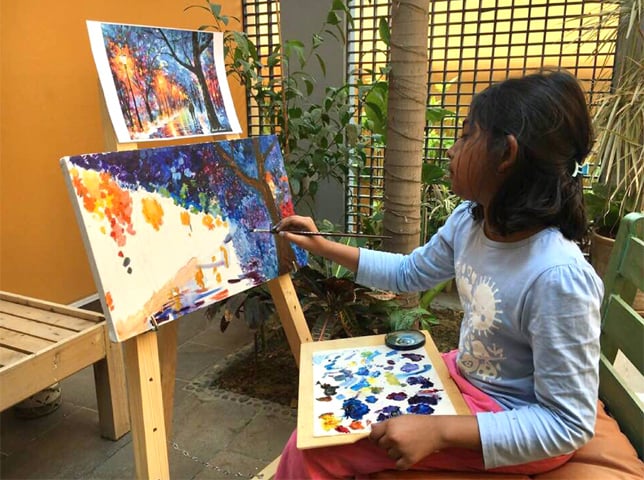KARACHI: Ten-year-old Amal Umer lost her life during a police encounter with criminals in Karachi on Aug. 13, 2018. She was denied emergency treatment at a nearby hospital. Her parents are now fighting to change the system that allowed it all to happen.
The girl’s father, Umer Adil, and mother Beenish Umer launched Rah-e-Amal, an initiative named after their late daughter to enforce regulations that would compel medical institutions to provide immediate assistance when life is at stake.
“The purpose of Rah-e-Amal is to implement the Sindh Assembly’s legislation in its true spirit so that other parents may not lose their children,” Beenish told Arab News after the launch of her nonprofit organization at the Aga Khan University Hospital in Karachi on Sunday.
“Our loss will never be regained,” she said, explaining that their initiative aims “to create a system that will make every life count.”

In this undated photo, Amal Umer is seen listening to music at her home in Karachi. (Photo courtesy: Beenish Umer)
Amal was hit by a police bullet while sitting in a car when the 2018 encounter took place on a Karachi road. For nearly an hour her parents struggled to get medical help, but it was denied as in gunshot cases examination and registration by a medico-legal officer (MLO) was required.
Police pleaded not guilty, stating that it was a criminal’s shot that killed Amal. The claim was untrue. A Supreme Court case ended last week with the Sindh government dismissing the officer who fired the fatal bullet.
The parents’ struggle led to the passage of the 2019 Sindh Injured Persons Compulsory Medical Treatment (Amal Umer) Act, which compels hospitals to treat injured persons on a priority basis, without any delay. Previous laws required MLO examination in gunshot cases. The regulations were remnants of British rule, meant to prevent freedom fighters from getting medical assistance before arrest.
“We don’t want that just a law be made,” Amal’s mother said, adding that she and her husband are now fighting through Rah-e-Amal for the law’s effective enforcement and the establishment of trauma centers at Sindh hospitals.

Amal Umer is seen painting at her home in Karachi. (Photo courtesy: Beenish Umer)
Amal’s friends have also joined the cause and when the Supreme Court was deliberating the case, they came to show their support.
“Amal was a very creative and nice girl, she loved art and cats,” said Hani Ali, the girl’s schoolfriend. “Some of us gathered outside the Supreme Court to support Beenish aunty and Umer uncle.”
“We lost our friend,” he told Arab News, explaining that they too wanted to make sure that no more children would ever die this way again.












